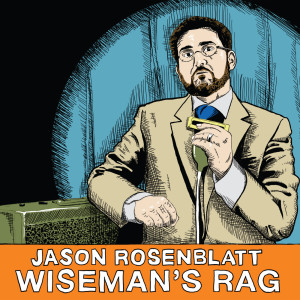Jason Rosenblatt, who’s best known for playing harmonica with the klezmer band Shtreiml, is releasing a CD of original blues and jazz tunes, musical genres his parents introduced him to.
Growing up, Rosenblatt, now 42, listened to his parents’ extensive collection of blues and early jazz records and tapes. “My parents were of that generation that was interested in the blues and they passed on that music to me,” Rosenblatt said.
At 13, an unenthusiastic piano student, Rosenblatt one day put on an album by Professor Longhair, the legendary New Orleans blues pianist, and played along with it. “It was one of the first times I had ever taken music I was interested in playing and tried to figure it out on my own,” Rosenblatt said.
When he was 15, he picked up one of his dad’s harmonicas. His father, Bernard, a doctor, played harmonica in a doctors and nurses band.
At first, Rosenblatt practised along with blues records, but at 16 – “a young Jewish kid with braces and a kippah,” he remembered – he ventured into Montreal’s blues bars.
At one of the clubs, he saw harmonica whiz Jim Zeller. “I would sit in the club and listen, and I would have a harmonica in my pocket, and when he was done with his set, I would run outside and practice the various licks that I heard,” Rosenblatt said. He went on to study with Howard Levy, a master of the diatonic harmonica.
“Everything he played on the instrument was radically different, and it went beyond my expectations of what the instrument can do, and I said to myself, ‘I have to play like that,’” Rosenblatt recalled.
He pays tribute to Levy on his new CD with the composition C Harp Blues. “I took an exercise he gave me and I turned it into a song,” Rosenblatt said.
Since 2002, Rosenblatt has been performing a mix of eastern European Jewish and Turkish music in concert halls and at festivals with Shtreiml. The band’s wedding repertoire includes the music of Rabbi Shlomo Carlebach, old-time chassidic, modern chassidic, classic rock, Motown, R&B and bluegrass.
Rosenblatt wrote and recorded Wiseman’s Rag because blues and early jazz was the first music he loved and because he wanted to get away from his “comfort zone of doing Jewish music,” he said.
Some of the songs on his 13-track CD – with Rosenblatt on harmonica, piano, Hammond B3 organ and vocals; Joe Grass on guitar; Joel Kerr on bass; and Evan Tighe on drums – are named after streets in Montreal.

The track Wiseman’s Rag, a ragtime piece that pays homage to Jelly Roll Morton, got its title from Wiseman Street in Outremont, where Rosenblatt lives.
Modern Life Blues sounds like a breakup song. In one verse Rosenblatt writes: “You told me many times before/ You’d never walk out the front door/ I guess I didn’t really know how bad you were feeling/ My special request for a second chance/ Was denied at first glance.”
But the lyrics aren’t autobiographical, the father of four said.
“I’m 42 years old, and I have a bunch of kids at home, and things aren’t always easy and don’t always go smoothly. And when you’re writing a blues song, why settle for ‘It’s not so bad’? Either it’s terrible or phenomenal, and I went to the terrible side of things. So it’s not autobiographical, thank God.”
Rosenblatt added that his lyrical inspiration for the CD is Cole Porter, whose lyrics are known for their wit, sophistication and clever rhymes.
The song Last Plane Out, written in New Orleans blues style, reflects the fact that Rosenblatt has been on the road alone recently, he said. Now that he and his wife, Rachel, who plays trombone in Shtreiml, have four children, aged 7, 5, 3 and 11 months, “she decided she didn’t want to come on every tour” with the band, he said, although the whole family joined him for Shtreiml’s West Coast tour of folk festivals this past summer.
The Jason Rosenblatt Quartet launches Wiseman’s Rag at GigSpace in Ottawa on Dec. 12. They will also be appearing at the Segal Centre for Performing Arts in Montreal on Dec. 6 at 8 p.m. as part of the Power Jazz series. Click here for more info.






